Vol. 5 No. 29 TROPIC LIGHTNING NEWS August 3, 1970
Index
Teen Hoi Chanh Conquers
Fear
By PFC PATRICK F. MURPHY
CU CHI -- A young boy compelled to fight for the Viet Cong, recently
conquered the fear built up in him by VC scare tactics and rallied to freedom at
Cu Chi's Ann-Margaret Gate.
The Hoi Chanh told his story to the division's 3rd Brigade civic action NCOIC,
Staff Sergeant Ronald Galluzzo.
Forced
"He told us the VC had forced him to join them during March of last year and
that he hasn't seen his family since," said Galluzo, of Springfield, Ohio. "At
first, he was assigned to an infantry unit. But he soon became frightened by
the constant allied shelling. He was then redeployed to a medical outfit." But
the med unit turned out to be little better for the frightened teenager.
Cook
"He had to be up at four every morning to cook breakfast and the evening meal
had to be prepared at eight o'clock, so observation planes couldn't spot the
cooking smoke. Between the artillery and the many snakes brought out by recent
rains, he was pretty miserable," added Galluzzo.
Although increasingly weary of this hazardous existence, the boy was
nonetheless fearful of his treatment at Allied hands if he should surrender.
Scared
"He was taken to meetings once a month for indoctrination and intimidation
and told repeatedly not to listen to US squawk ships or read Chieu Hoi
leaflets," Galluzzo continued. "He was also warned that the allies would kill
him as soon as he surrendered."
He finally overcame his apprehension, and at the first opportunity, deserted
his post, and fled to Cu Chi Base Camp.
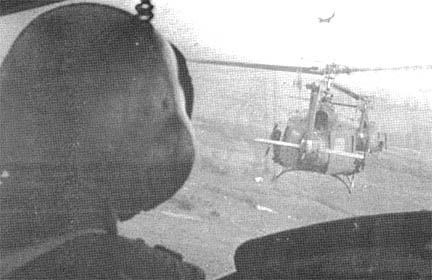 |
AIR JAM - This 116th Assault Helicopter Company Yellow Jacket pilot looks out on a sky full of traffic over Dan Tieng. (Photo by SP4 Ed Toulouse) |
Five Enemy Killed
Manchus Gun Down NVA
TAY NINH - First Brigade elements recently killed five NVA soldiers in a late
night ambush a mile west of Tay Ninh base camp.
An element of Alfa company, 4th Battalion, 9th Infantry Manchus was set up in
a night position along a trail when enemy movement was spotted. The Manchus
opened fire with small arms and machineguns.
The estimated five enemy returned with small arms fire and Staff Sergeant
Howard Dean, Butte, Mont., the platoon leader, called in the brigade's Nighthawk
gunship and artillery support.
After about ten minutes contact was lost and the Manchus searched the area
and located two enemy killed by their rifle fire and three others killed by the
Nighthawk guns.
"We came through without a scratch," Dean said. "We were alert and ready for
anything that came along."
Besides the enemy killed, the Manchus found three rocket propelled grenades
with boosters, an assault rifle with ammunition, four Chicom grenades, several
rifle grenades and a small amount of medical gear.
| CONGRATS -- One of 45 GIs who finished his GED high school equivalency degree recently picks up his diploma at a Cu Chi ceremony. |
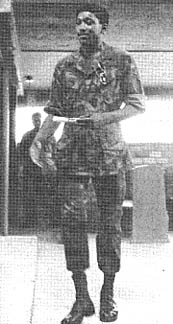 |
Private 'Pappy'
By SP4 ED TOULOUSE
FSB WARRIOR - Two overseas tours -- one in Germany and the other in Guam --
with an honorable discharge in 1952 may have been enough army duty for the
average GI but not for "Pappy." He came back.
In January 1967, almost fifteen years after his July 18, 1952 discharge,
thirty-seven year old Private Josh Murray (nicknamed Pappy) of Bald Knot, Ark.,
was back on a PT field, this time at Fort Leonard Wood, Mo., shouting "Airborne
ranger" along with his fellow basic trainees.
No Rookie
Pappy was no rookie. His first dose of army PT was with the 10th Armor
Division at Camp Chaffee, Ark., in 1948. And later, in 1951, Murray was a PT
instructor at the Edgewood Arsenal in Maryland. But more than fifteen years had
passed since then.
First Sergeant Jimmie
Johnson of Birmingham, Ala., presently with Echo Company, 2nd Battalion, 12th
Infantry, was Pappy's basic training drill instructor - this second time.
Stuck it Out
"Some of the younger men playfully called him the "old soldier" and kidded
him about keeping up, but he stuck it out," recalled Johnson. "In fact his PT
test score was over the company average," he added.
"The instructors treated me just like any other private that had just come
into the army," explained Murray. "I didn't ask for anything that I didn't
deserve."
Third Tour
Pappy, presently a supply sergeant with Delta Company, 2nd Battalion, 12th
Infantry, is in the fourth month of his third tour in Vietnam - he likes it
here.
"I've enjoyed the opportunity to go overseas," said Pappy. "I've never cared
for stateside duty."
| WELCOME SIGHT -- Members of Alfa Company, 2nd Battalion, 12th Infantry, anxiously await choppers to take them in to base camp. (Photo by SP4 Ed Toulouse) |
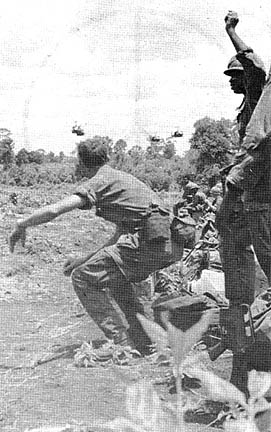 |
Page 2 TROPIC LIGHTNING NEWS August 3, 1970
Decorated
| SILVER STAR | |
|
CPT John E. Lockner, Co C, 2d Bn, 12th Inf 1 LT Kenneth J. Liljestrand, Co C, 2d Bn, 12th Inf |
SP4 Gerald J. Camelleri, F Co, 75th Inf SP4 Ronald J. Hodges, Co E, 3d Bn, 22d Inf |
|
DISTINGUISHED FLYING CROSS |
|
|
MAJ Richard W. Cato, HHC, 2d Bn, 12th Inf CPT Robert W. Simmons, D Trp, 3d Sqdn, 4th Cav |
WO1 Dennis L. Hubbard, HHC, 2d Bde SFC Ronald O. Godman, D Trp, 3d Sqdn, 4th Cav |
|
BRONZE STAR |
|
|
COL Ennis C. Whitehead Jr, HHC, 2d Bde LTC Birtrun S. Kidwell Jr, HHC, 2d Bn, 34th Armor LTC Shepperd H. Phillips, HHC, 2d Bn, 12th Inf LTC Charles S. Stodter, HHSB, 2d Bn, 77th Fid Arty MAJ Elijah H. Gardner, HHC, 1st Bde 1 LT Stephen Candela, Co C, 3d Bn, 22d Inf 1 LT David L. Phillips, Co A, 2d Bn, 14th Inf 1 LT Randall C. Smith, Co B, 2d Bn, 22d Inf SGT Claude W. Cooper, Co B, 2d Bn, 22d Inf SGT Daniel L. Dailey, Co B, 2d Bn, 22d Inf SGT Gordon R. Grieve, F Co-75th Inf SGT Jerry R. Holland, D Trp, 3d Sqdn, 4th Cav SGT William G. Kock, Co C, 2d Bn, 22d Inf SGT Joseph F. Miller, Co C, 3d Bn, 22d Inf SGT Kenneth C. Russett, Co C, 3d Bn, 22d Inf |
SGT Malcom M. Sheffield, Co D, 2d Bn, 22d Inf SGT Larry J. Simpson, Co C, 2d Bn, 22d Inf SGT James A. Wilfe, Co A, 2d Bn, 14th Inf SGT Martin L. Woodruff, D Trp, 3d Sqdn, 4th Cav SP4 Damian Aider, Co B, 2d Bn, 22d Inf SP4 James H. Baker, Co A, 2d Bn, 14th Inf SP4 Gary R. Freeman, D Trp, 3d Sqdn, 4th Cav SP4 Robert A. Holtzman, D Trp, 3d Sqdn, 4th Cav SP4 Michael J. Magnotta Jr, Co B., 2d Bn, 27th Inf SP4 Richard L. Pugh, Co C, 3d Bn, 22d Inf SP4 Daniel L. Rawlings, Co D, 2d Bn, 27th Inf SP4 Otimo P. Vasquez, Co C, 3d Bn, 22d Inf PFC Kent O. Beavers, Co B, 2d Bn, 27th Inf PFC Ben H. Bodine Jr, Co D, 2d Bn, 27th Inf |
Prevent Problems
Keep Records Straight
By SP4 SCOTT WATSON
Many servicemen, upon ETSing, make a bad mistake by either loosing or
destroying their military records. For the rest of a man's life, he will be
called upon to produce these records. They also hold the key to benefits that
may be claimed many years after the man leaves the service.
It's a good idea to start a personal record file. The large envelope that
discharge papers come in can be used for this purpose, or any file will do the
job. This personal file will save much searching and inconvenience as the years
click away and will provide orderly safekeeping for service associated papers.
About the most important item to include in the file, is DD form 214, Armed
Forces of the United States report of discharge or transfer. This is a brief
account of military service and should be registered with the county recorder in
the serviceman's home town, for his own protection. The original should be kept
in a safe fireproof place, while photocopies should be placed in the file for
quick reference. Copies are required as evidence of eligibility for veterans
benefits.
Included in the file should be a serviceman's shot record, (which should be
kept up to date), government insurance policies, including premium payment
records, and papers associated with active duty, such as orders to and releases
from active duty, pay vouchers, warrants, commissions and diplomas.
GIs Get To Switch Their Jobs
Any enlisted man who arrives in Vietnam and is assigned to a line outfit with
an MOS of 11 Bravo, has the opportunity to change his MOS if he is skilled in
another. This option is open to anyone who has been in the Army for eight
months or more.
By re-enlisting for three years, which begins on the day of re-enlistment,
the enlisted man may terminate his present obligation. Instead of spending two
or three years as a rifleman, he can begin working as an MP, a supply clerk, a
typist or what ever he is qualified for.
Re-enlistment guarantees any qualified enlisted man the opportunity to change
his present MOS, and he will be immediately reassigned to a new Vietnam job.
Re-enlistment authorizes the EM to at least a 30 day special leave, a $643
cash bonus and an immediate R&R to China Beach.
If the EM has been in the service for eight months and re-enlists, his total
time in the army will be three years and eight months. Re-enlisting does not
change the EM's DEROS date.
Re-enlistment offices located across the street from Waikiki East in Cu Chi
and near brigade headquarters in Tay Ninh, will test any interested enlisted man
to determine what jobs he is qualified for.
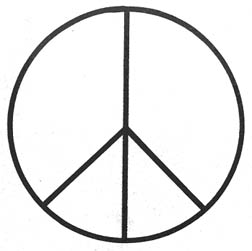 |
Symbol For What? The circular peace symbol shows up all over Vietnam, demonstrating the GIs sincere desire for peace. Yet few understand its history. The peace symbol, with its intersecting lines, was designed back in February, 1958 by a group of Englishmen, for use in a campaign supporting nuclear disarmament. The Englishmen decided to use the circular symbol because the phrase "unilateral nuclear disarmament" was too cumbersome for parade banners, and they wanted something that the people would remember. The result was a composite basic form of a semaphore signal for the letters "N" and "D", taken from the words nuclear disarmament. The black lines symbolized a distraught human, the circle -- the world, and the white back ground - eternity. The symbol eventually became universally recognized as a symbol for peace. |
VOTE
Even though the fall elections may seem a long time away, action should be
taken now to prepare for them.
The Department of Defense has declared September 25 as Armed Forces Voters
Day. Voting officers in division units will be making available form 76,
request for ballot, to all interested personnel. An initial distribution has
been made to unit personnel offices who will also receive and make available
"Voting Information 1970," a pamphlet consisting of vital information for all
voters.
Since many states differ in their rules concerning voting procedures, it will
be necessary for individuals to inquire home to find out what they must do in
order to vote in their states.
Any further inquiries should be directed to unit voting officers.
Tropic Lightning Tots
The Commanding General Welcomes
The Following Tropic Lightning Tots
To The 25th Infantry Division – As
Reported By The American Red Cross.
Born To:
| June 20 LT Paul J. Callen, 25th MP Co, girl SP4 Robert J. Phalin, B Btry, 5th Bn, 2nd Arty, boy June 21 SP4 John C. Dinger, Dau Tieng PX, girl June 22 LT Francis Frediani, HHC, 1st Bde, girl June 23 SGT Daniel P. Daneph, 5th Weather Sq, boy |
June 23 SP4 Robert Seydlitz, HHC, 1st Bde, girl June 25 SP4 Harry E. Carpenter, 25th Admin Co, girl July 8 PFC Harry J. Filoh, HHC 4th Bn, 9th Inf, boy July 10 LT Edwin Najion, Co D 2nd Bn, 12th Inf, boy SP4 Craig A. Johnson, HHD 2nd Bn, 77 Arty, girl |
The TROPIC LIGHTNING NEWS is an authorized publication of the 25th Infantry Division. It is published weekly for all division units in the Republic of Vietnam by the Information Office, 25th Infantry Division, APO San Francisco 96225. Army News Features, Army Photo Features, Armed Forces Press Service and Armed Forces News Bureau material are used. Views and opinions expressed are not necessarily those of the Department of the Army. Printed in Tokyo, Japan, by Pacific Stars and Stripes.
MG Edward Bautz, Jr . . . . . . Commanding General
MAJ Warren J. Field . . . . . . Information Officer
1LT John Caspari . . . . . . . . . Officer-in-Charge
SP4 Bert Herrman . . . . . . . . . Editor
SP4 Scott Watson . . . . . . . . Assistant Editor
SP4 Joseph V. Kocian . . . . . Production Supervisor
BATTALION CORRESPONDENTS
| SGT Mike Keyster SP4 Tom Benn SP4 Frank Salerno PFC Nick Haren SP4 Henry Zukowski PFC Robb Lato SP4 Greg Duncan SP4 Rich Erickson SP4 Ed Toulouse SGT Mike Conroy SP4 Dan Davis |
4/23 7/11 2/22 2/22 2/22 2/27 2/27 2/14 2/12 3/4 Cav 1/27 |
SGT William Zarrett SGT Daniel House SP4 George Graham SP5 Tom Watson SP4 William McGown PFC James Stoup SGT Derr Steadman SP5 Doug Sainsbury SP4 James Duran SGT Jack Strickland SGT Mark Rockney |
4/9 4/9 269th 725th Divarty 65th Eng Discom 2/77 3/13 1/27 2/12 |
Page 3 TROPIC LIGHTNING NEWS August 3, 1970
Rewards and Frustrations
Tales of a Cannoneer
By SP5 DOUG SAINSBURY
FSB REDLEG - "When we are out in the boonies at a patrol base firing support
for the infantry, our morale is sky high and things are great," he said. "But
when we are at a fire support base firing mostly illumination and radar
pick-ups, we spend a lot of time on the appearance of the area. We don't like
this too much."
"Life in the field as a cannoneer can be frustrating or very rewarding,
depending on where you are and what your situation is," Corporal Jim Robison
from Overton, Nev., said. Robison is an acting howitzer section chief with Alfa
Battery, 2nd Battalion, 77th Artillery.
He began his tour in a howitzer section as an ammo handler. "When I first
came into the battery, we were at Patrol Base Kotrc near the Cambodian border.
They had received a ground attack shortly before I arrived, and I was a little
nervous," he said. "I had expected Kotrc to be buried in jungle, and I guess I
was disappointed when the chopper landed and there was nothing but open field and
a few hedgerows."
"I liked it at Kotrc because only three of our guns were there and we lived
with the infantry and fired a lot of contact missions for them," Robison said.
"No one bothered us and we worked hard at doing our job," he continued. "Our
morale was high and we really felt like we were involved in tactical
operations."
United
During Tet this year, all six howitzer sections of Alfa Battery were united
at FSB Jackson.
"It was the first chance for the men in the battery to get to know each other
after being split for so long," Robison said. "At first the morale was great,
but then tensions began to run high because we weren't firing as many contact
missions and we had to spend a lot of time on beautification."
Number 1
It was at FSB Jackson that the young Redleg advanced to the position of
Number One Man (the one who loads the rounds into the howitzer).
"Number One Man is the most dangerous job on a gun because you have to stand
between the trails and watch out for the recoil of the barrel and breachblock
assembly," Robison said.
Alfa Battery remained at Jackson for several months and then began to be
airmobiled in for short-term stints at various patrol bases and hard spots in
the Division's area of operations.
Section Chief
At Patrol Base Harry, southwest of Cu Chi, Robison became acting howitzer
section chief - a job he has been doing ever since.
"Chief of section is a job I really enjoy because it involves a lot of
responsibility and you learn a few things about psychology in supervising
personnel," he said. "When we were making moves every few days and the rations
and mail resupply had a tough time keeping up with us, I learned that if a man
has mail, a chance to take a shower and a good meal, you can get an awful lot of
work out of him.
105's
The 2/77th is a 105 howitzer battalion, using what are considered "light"
howitzers.
"I think the 105 (howitzer) plays the most important role in artillery
because we fire more than the heavier guns and we are able to put rounds on the
enemy even when our own infantry is close to the impact area." Robison said.
Mobile Alfa:
Have Gun Will Travel
By SP4 TOM BENN
TAY NINH - A high degree of mobility made Alfa Battery, 7th Battalion, 11th
Field Artillery, a timely source of fire power during Cambodia operations.
Alfa stayed in Cambodia longer than any of Seven-Eleven's other line
batteries - almost 45 days. What's more, the unit never stayed in one spot for
more than three or four days.
In the month and a half Alfa was in Cambodia it moved 15 times. According to
Captain Rance Farrell, Alfa Battery commander, the battery could move to a new
location and set up in almost the same amount of time it took to drive to the
new hard spot.
The moves were tiring.
"For the first few moves we treated the moving as just part of the job," a
Redleg said. "But, as time passed, more men were becoming fatigued because of
the almost constant tearing down and rebuilding."
"When the news came that the move to a point northwest of Memot would
probably be the last in Cambodia, spirits picked up. The men handled the move
with skill gained during the previous moves, but also with some relief because
it meant we'd soon be 'back home' in Vietnam," he said.
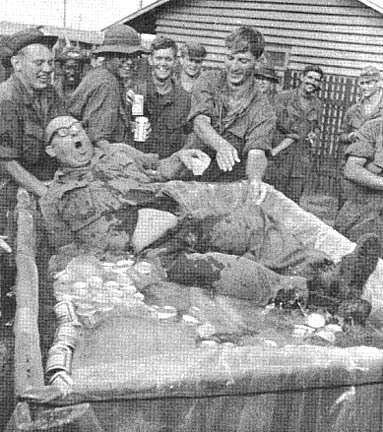 |
UH-UHH-UHHH-UGH -- An NCO from 2nd Battalion, 27th Infantry, Wolfhounds takes a frigid dip in a van of ice and beer cans. (Photo by SGT Jack Strickland) |
Manchu Honors
TAY NINH - In two separate award ceremonies recently, five members of the 4th
Battalion, 9th Infantry, Manchus were presented Silver Stars for valorous
actions while serving with their units during operations in Cambodia.
Three persons from Company were decorated: Captain Bruce S. Brooks of Winter
Park, Fla., Specialist 4 James A. Fox of Harbor City, Calif., and Private First
Class Alexander P. Ott of Seaside, Calif.
Also decorated were Specialist 4 John F. Hans Jr. Of Charlie Company from
Nassau, N.Y. and Specialist 4 John P. Schaad of Delta Company from Stockport,
Ohio. Hans and Schaad were also presented with plaques as newly elected members
to the Combat Honor Roll.
The presentations were made by Brigadier General M.J.L. Greene, the assistant
division commander.
In Cambodia, the Manchus operated north of the Dog's Face with other 1st
Brigade units. The units uncovered the bulk of enemy supplies found by the 25th
Division.
|
Medical Project Makes Friends In Ex-VC Town DAU TIENG - The former Viet Cong dominated hamlets near here have shown an increasing response to MEDCAP efforts by Golden Dragons, according to members of the Medical Civic Actions Program. The daily routine of bringing medical aid and clothing has been the keystone to gaining the people's trust, explained Master Sergeant John Wright, the Civic Actions NCO for 2nd Battalion, 14th Infantry. "In certain hamlets only the kids would come out to get the candy we always had for them." However the adults soon realized we were bringing aid on a regular basis and as their trust increased, we began to treat more of them." "Along with on-the-spot treatment," he continued, "we also pass out information on dental and general hygiene." "The way to insure a large turnout," explained Specialist 5 Stan Hamby of Evansville, Ind., "is to arrive at a time when their normal working and eating habits won't be interrupted. This is not always easy to do until one becomes familiar with the customs of these people." |
|
Page 4-5 TROPIC LIGHTNING NEWS August 3, 1970
Engineers Dunk In Reopened Pool
By PFC JAMES D. STOUP
CU CHI -- Snip went the ribbon and splash went Charlie Company, 65th
Engineers. Waikiki East Swimming pool reopened recently and a celebration was
in order.
The band played and cameras snapped, as five fully-dressed donut dollies,
several officers and reluctant engineers, the battalion correspondent and the
editor of the Tropic Lightning News got thrown in the water by the zealous
65th.
The pool was closed in May because of impending collapse. The 65th Engineer
Battalion was called in. Bravo Company analyzed he situation and cleared the
land area while Echo Company constructed a "Bridge Over Troubled Waters." A
total of five dry spans were constructed over the pool, dismantled and shifted
around to act as a platform for the crane which drove piles 38 feet into the
ground to strengthen the sides of the pool.
Then Charlie Company entered the scene to dig out the new pool area, replace
the rubber membrane bottom, and complete the cement work and landscaping.
Charlie Company had just returned from six months in the field in support of
the 2nd Brigade, when they were assigned the Waikiki East project. They worked
on round-the-clock shifts to rush completion and to have the honor of being
first company in the pool.
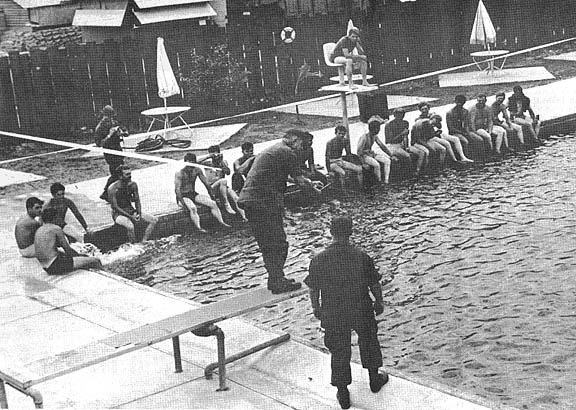 |
| RIBBON CUTTING -- Colonel T. J. Hanifen, division chief of staff, cuts the ribbon to open the pool. (Photo by SP4 Joe Loper) |
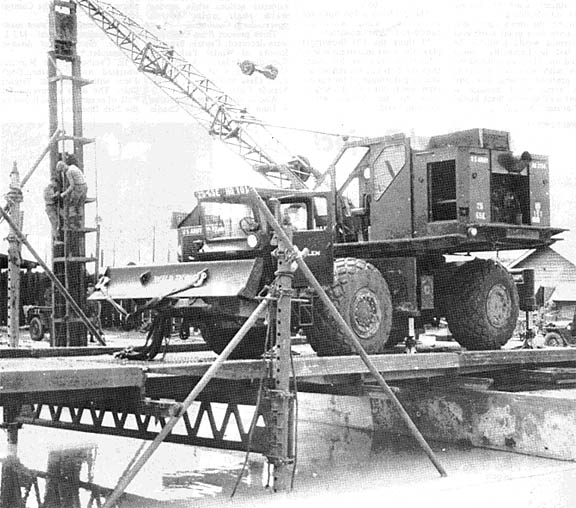 |
| WILD THING -- You move me. A giant crane pounds 38 foot piles into the sides of Waikiki East pool. (Photo by PFC James D. Stoup) |
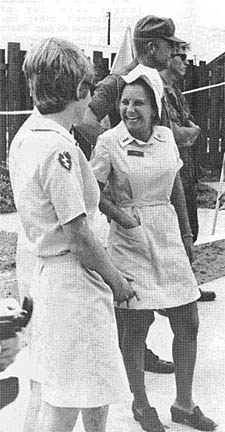 |
LOTS OF LAUGHS -- Donut Dollies Judi and Diane find the pool opening very amusing. (Photo by SP4 Bert Herrman) |
| LOST CAUSE -- Reluctant engineer discovers he's going swimming. (Photo by SP4 Bert Herrman) |
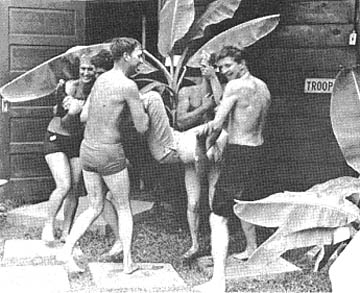 |
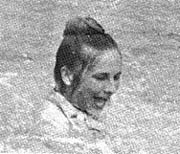 |
ENTER LAUGHING -- Diane finds herself in the water. |
| OH WELL -- Judi follows after. (Photo by PFC James D. Stoup) |
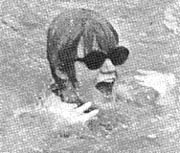 |
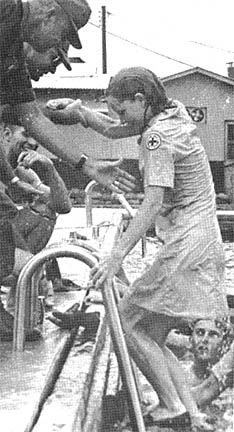 |
DRIP-DRY -- Judi emerges from the soggy depths. (Photo by PFC James D. Stoup) |
| FWOP! -- 65th Engineer Battalion correspondent enters the water ungracefully. (Photo by SP4 Bert Herrman) |
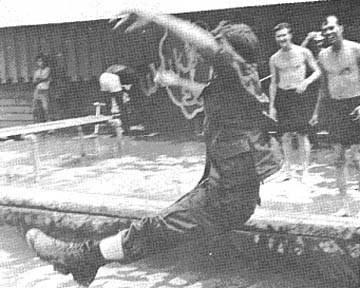 |
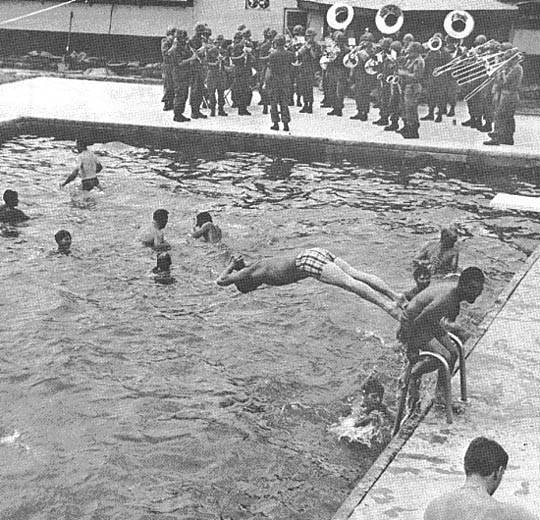 |
| FIRST PLUNGE -- Charlie Company, 65th Engineer Battalion splashes in as the band plays on. (Photo by SP4 Joe Loper) |
Page 6 TROPIC LIGHTNING NEWS August 3, 1970
|
Chaplain's Choice CU CHI - "Most of us prefer to be with combat troops out in the field," explains Chaplain (Lieutenant Colonel) Roy Peters, division chaplain. "You find that in the base camp situation there isn't the urgency or the pressure that there is in the field." "When you are face to face with the realities of life, your religion means a lot more to you. You've got the time to think about it, as well as the circumstances that make you think about it," says Chaplain Peters. "In the field, I feel that the troops appreciate the chaplain coming to them and they show it. They are a little more real and a little more honest with you." Chaplain Peters, from Sacramento, Calif., recently replaced Chaplain (Lieutenant Colonel) Gene M. Little of Jericho Springs, Mo., as division chaplain. Father Peters has been a priest for 22 years and a chaplain for eight. Chaplain Peters, like other combat chaplains appreciates the rapport with the men that he finds in the field. Many men who were not churchgoers back in the world are found going here in Vietnam simply because, as one trooper put it, "They say it in English." |
THE AMBUSH
By SP4 ED TOULOUSE
DAU TIENG - "I swatted again - missed, then went back to searching out the
darkness. I had been awake sitting in the wet paddy for almost fifty-three
minutes - seemed like hours. The only breaks in the silence had been answering
the 'sit reps,' (situation reports) called from base on the radio and the
occasional snoring from somebody down at the end of the position."
So go the reflections of a 2nd Battalion, 12th Infantry soldier on the
previous night's ambush patrol.
"A flare went up in the distance. I glanced at my watch and studied the
dial. - It's time!"
"I touched the guy next to me. He woke with a nervous start."
"What's the matter?" "Shh... ! Your guard." "Oh yeah. Okay."
The time is 1:01 am.
Typical American operations in Vietnam center around the nocturnal attempts
to surprise Charlie - the ambush.
If a grunt ever forgets anything about this tour, it probably won't be how to
set up a claymore or stay awake on guard duty. Fond memories they're not.
"When I think of a 'bush,' all that comes to mind is rain and mosquitoes,"
said Specialist 4 Paul Engrav, of Rochester, Minn., now a clerk with Delta
Company, 2nd Battalion, 12th Infantry.
The minutes of guard duty often seem endless according to the soldiers.
"When I'm on guard duty, guessing at the time is like a weird game," said
Specialist 4 Steve Crider, of Marion, Ky. "I try not to keep looking at my
watch," he added. "It really makes time drag."
While the eyes are constantly scanning the night, the ever-tense mind
occasionally seeks an escape. Reality can be softened by pleasant thoughts. Perhaps it
is something in the letter from a girl or wife; maybe it's an upcoming R&R.
Nevertheless, the grunt never forgets where he is.
Ask these guys who go on a "bush" - Charlie's out there.
| Ilikai East by Night WED Floor Show (6 or 8 p.m.) THU Plug-A-Pack (8 p.m.) FRI Cookout (8 p.m.) SAT Tourneys (2 p.m.) Movie & Popcorn (7:30 p.m.) SUN Coffee Call (10 a.m.) Tourneys (2 p.m.) Bingo (8 p.m.) MON Make Your Own Sandwiches & Small Games (8 p.m.) TUE Contract Bridge (7:30 p.m.) Movie (7:30 p.m.) |
Ask Sgt. Certain
DEAR SGT CERTAIN: Our CO has been telling us that we're headed for a place
called, Swan Lake. My buddies and I have always imagined Swan Lake as a crystal
pool with graceful birds surrounded by weeping willows. Could this be in
Vietnam?
PFC
Grimm
DEAR PFC: The original commanding officer conceived the compound at Xuan Loc
(Swan Lake) as a circle of cottages around a large lake. But it didn't rain for
three days and Swan Lake shrank to a mosquito infested puddle. The chief of the
town sent to Calcutta for a rare and beautiful pure-white Indian swan. However
the night before the formal dedication a GI who had read the Charlie Ration
Cookbook snatched and cooked the fowl and gave the CO the bird.
DEAR SGT CERTAIN: My mother has just written to ask me what has happened to all
the rice we found in Cambodia. Well?
F. Ishent
DEAR F.: The division came up with three solutions to the problem: (1) leave it
in warehouses where it will naturally ferment; rice wine (saki) will be served
each evening at the mess halls. (2) make breakfast cereal by shooting it from
guns. (3) print future editions of the Tropic Lightning News on rice paper,
which can be eaten out in the field to augment C's.
DEAR SGT CERTAIN: The other night I had the choice between reading your column
or an Agatha Christie Mystery novel. The butler did it.
Miss Tri
DEAR MISS: I'm pleased to be in such good company. By the way, SGT Certain's
new novel will be rolling off the presses soon. In case you're interested it's
entitled "How I Won the War" or "Certain Victory."
Page 7 TROPIC LIGHTNING NEWS August 3, 1970
Triple Deuce Moves Out
By SP4 FRANK H. SALERNO
THIEN NGON -- In a 24-hour time span recently, an entire 25th Division
mechanized battalion moved to and set up a new area of operations in Katum.
The 2nd Battalion (Mech), 22nd Infantry, using all its available armored
personnel carriers to provide security for the loaded-down wheeled transport
vehicles, traveled 50 miles first to Tay Ninh and then north to Katum.
An ARVN unit remained behind to maintain the Triple Deuce's former AO at
Thien Ngon which, according to Battalion Commander Lieutenant Colonel Nathan
Vail, has been pretty well cleared of NVA.
Despite the intense heat and rough road, the convoy met few problems and
after six hours on the road, arrived at Katum.
Tired and grimy, the men still had a night laager position to set up.
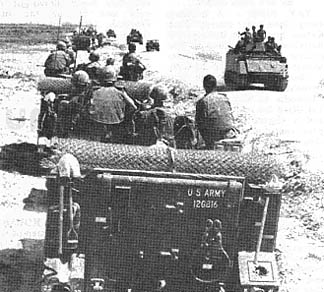 |
REPLACMENTS -- Armored personnel carriers of the 2nd Battalion (Mech), 22nd Infantry, pause outside of Thien Ngon as elements of the 4th Battalion, 49th ARVN Regiment, move into the area which was one of the large staging areas for 25th Division's assaults into Cambodia. |
| SETTING UP -- Members of Triple Deuce start to set up their night laager position at Katum by first unloading their armored personnel carrier. |
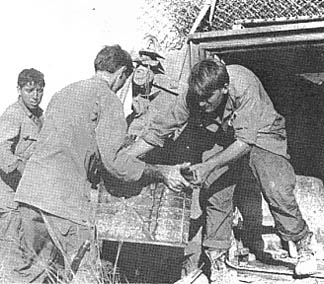 |
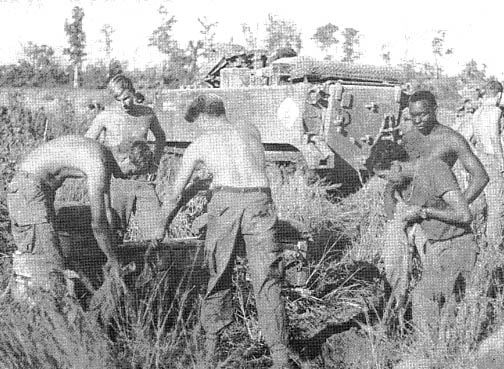 |
SAND BAGGING -- Members of the mortar platoon of Triple Deuce fill sand bags as they build a back blast wall for their 81mm mortar track. |
| TRACK PROTECTION -- Members of Bravo Company, 2nd Battalion (Mech), 22nd Infantry, set up an RPG screen in front of their carrier as added protection from possible incoming rounds. |
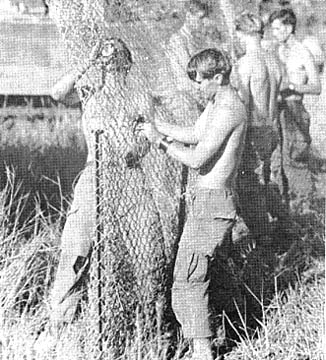 |
 |
| WHEELED VEHICLES -- Trucks in the convoy of the 2nd Battalion (Mech), 22nd Infantry, move the battalion's supplies through a village just outside of Tay Ninh towards their destination of Katum. |
Page 8 TROPIC LIGHTNING NEWS August 3, 1970
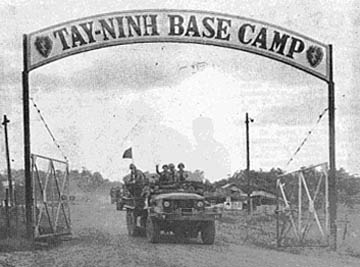 |
BATTERY RETURNS -- Jubilant artillerymen from Bravo Battery, 7th Battalion., 11th Artillery, drive through the main gate of Tay Ninh. Bravo, the first artillery battery from the 25th Division to cross into Cambodia, returned to base camp after three months in the field. |
7/11 Returns To Tay Ninh
By SP4 TOM BENN
TAY NINH - A grueling, dusty four-hour convoy from Katum gave Bravo Battery,
7th Battalion, 11th Artillery its first glimpse of base camp after almost three
months in the field.
"Battling Bravo", the first Division Arty unit to cross into Cambodia in May,
returned to Tay Ninh for a brief standdown and a chance to get vehicles, guns
and equipment ready for their next assignment.
Excitement
According to Sergeant Chuck Beck, a Bravo section chief, "the men in the
battery are excited. They're looking forward to the things like the PX and the
steam bath," he said. "But after a while they'll get tired of it."
Bravo Battery left its permanent position at Fire Support Base Buell, halfway
between Tay Ninh Base Camp and Nui Ba Den, in April when they moved to the
Renegade and Straight Edge Woods to support engineers in Rome Plow operations
there.
First Over
When the Cambodian operation began, Bravo got the call and became the first
Division Arty unit to touch Cambodia when it crossed a bridge at FSB Minnie.
The Redlegs from the On Time battalion were constantly on the move while in
Cambodia in June.
| Dear Daddy, I wish you could be here. We bought you some cards but we left them their. I really miss you. I guess by now you have gotten my first letter. I have written you about
three times. |
Manchu Got The Spirit
By SGT DANIEL A. HOUSE
TAY NINH - The men of the second platoon, Company B, 4th Battalion, 9th
Infantry, Manchus recently encountered a friendly ghost on one of their nightly
ambushes.
As the platoon moved into its nighttime positions and set up for the
evening's activities, Private First Class John P. Stephan of St. Louis placed
his equipment down next to his position and made himself comfortable. A little
later he noticed his rucksack was moving in a rather mysterious manner.
"I didn't know what it was and I wasn't even going to reach down there to
find out," Stephan said. "I just backed away a couple of feet and watched. I'd
push the rucksack down and it would pop back up and sway around like it was
haunted."
Meanwhile, Stephan's comrades around him were trying to figure out his
peculiar behavior, including the acting platoon leader, Staff Sergeant Ronald
Books of North Platte, Neb., who was trying to use the radio. "I kept trying to
hold the handset up to my mouth to use it but somebody kept pulling it away."
Finally, it was discovered that the cord had become hooked on Stephan's
rucksack frame. Said Stephan after it was all over, "I may have felt silly, but
you best believe I was relieved."
Arty's Act Better At Word 'Contact'
By SP4 TOM BENN
TAY NINH - "Artillerymen are 100 percent better when they hear the word
'contact! It's like someone gave them a shot of hormones," 1st Sergeant
Corinthian Jones, Headquarters Battery, 7th Battalion, 11th Artillery, said.
The 19-year artillery veteran should know. He's now on his second tour with
the "On Time" battalion.
It's a good outfit," he said. "I've been with 15 battalions and this one is
the best."
"But, there seems to be a lack of urgency today. The morale is not as high
as it used to be probably because of the lack of contact," Jones said.
"Before there were more rockets and fire support bases were subject to ground
attacks. Arty used to constantly get contact fire missions."
Jones also said the Redlegs don't get the credit they deserve. "That's
because in other wars the artillery was always way behind the front lines while
the infantry was 20 miles up front. But now arty defends its own perimeters,"
he said.
This is the last time around for Jones. He retires in November. He has one
goal:
"My ambition in a combat area is to go home with the peace of mind that I've
had the least number of men killed or wounded because of carelessness."
Hawk For Sale
By SP4 RICH DOMBROWICKI
CU CHI - Hey G.I., you wanna hawk?
A 3rd Brigade LOH (Light Observation Helicopter) pilot, nearing his DEROS, is
offering his pet hawk to anyone who would like one.
Warrant Officer Craig Tate of Headquarters Company owns the "baby" bird which
is only a few months old but already weighs five pounds and has a three and one
half foot wing span.
Discovery
"I found him at an ARVN compound near here," Tate, of Riverside, Calif.,
said. "He had fallen out of his nest and was just fluttering around."
A wing was broken in the fall, but the division veterinarian patched him up
and now he is on the mend, although still unable to fly.
Contest
Named "Shadow" in a company contest, the bird likes to dine on small rodents
and lizards that it catches with its razor-sharp claws.
"We used to feed him steaks, but he lost his taste for that," Tate remarked.
Asked why he made a hawk his pet instead of a dog or monkey, Tate replied, "I
like to be different."
Anyone who'd like a "different" kind of pet may call the 3rd Brigade Snoopy
Pad.
| A BIRD IN HAND -- Warrant Officer Craig Tate, a light Observation Helicopter pilot from the 3rd Bde, shows off his pet hawk, Shadow, who he is offering to anyone who would like it. |
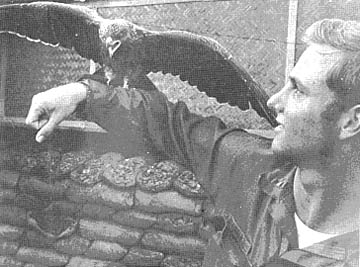 |
Thanks to:
Roger Welt, 4th Bn., 23rd Inf., and a Tropic Lightning News correspondent,
for sharing this issue,
Kirk Ramsey, 2nd Bn., 14th Inf. for creating this page.
This page last modified 07-28-2006
©2006 25th Infantry Division Association. All rights reserved